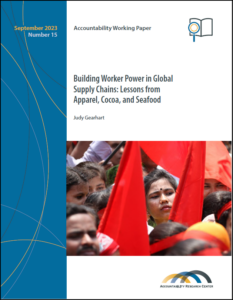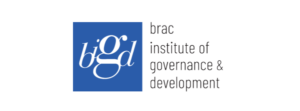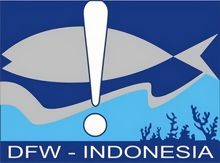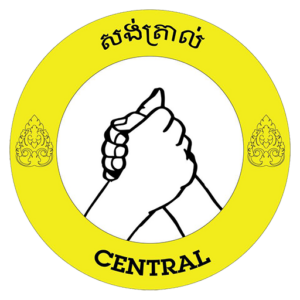Organizers meeting with Cambodian fishers in Chon Buri, Thailand. Credit: Judy Gearhart
About the Work
ARC draws lessons from multiple industries—including manufacturing, agriculture, and fishing—to understand how national worker rights advocates have sought to hold governments and corporations accountable.
The ARC team works closely with worker rights advocates to understand their priorities and the strategies that advance them. ARC engages in and facilitates policy dialogue and learning exchanges. We help connect corporate leaders and worker advocates to identify more effective corporate accountability policies.
Two central questions guide this program. First, how do workers and affected communities seek to hold multinational corporations (MNCs) accountable—directly or through government regulations? Second, what government policies and corporate programs enable workers to exercise their rights and secure remedy?
Research professor Judy Gearhart leads the program for ARC, leveraging over 30 years of experience building multi-stakeholder coalitions to help workers and affected communities secure legal and corporate reforms.
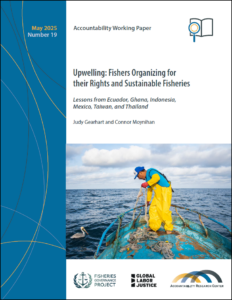 This Working Paper (English, Spanish, Bahasa, Thai, and Chinese) documents context and trends in fisher organizing in six countries. Over two years, ARC researchers worked with partner organizations to interview worker organizers, rights advocates, and fishery governance experts, asking how fishers are seeking to influence the policies and practices that have an impact on their livelihoods. Country case studies (Ecuador, Ghana, Indonesia, Taiwan, and Thailand) give more in-depth analysis.
This Working Paper (English, Spanish, Bahasa, Thai, and Chinese) documents context and trends in fisher organizing in six countries. Over two years, ARC researchers worked with partner organizations to interview worker organizers, rights advocates, and fishery governance experts, asking how fishers are seeking to influence the policies and practices that have an impact on their livelihoods. Country case studies (Ecuador, Ghana, Indonesia, Taiwan, and Thailand) give more in-depth analysis.
Program areas
1. Worker-driven solutions for advancing accountability
Worker voice, as protected by the right to organize trade unions and to bargain collectively, is essential to advancing corporate accountability. These core, enabling rights are necessary for any sustainable prevention of egregious abuses such as forced labor, child labor, and gender-based violence. They are also critical building blocks for advancing equity and enabling workers to seek remedy for rights violations.
‘Remedy’ is the third pillar of the UN Guiding Principles (UNGPs) on Business and Human Rights (after ‘Protect’ and ‘Respect’) – and the most challenging to fulfil for companies and governments alike. It requires that workers have the agency to seek out and demand remedy. Yet governments intent on maintaining ‘business-friendly’ export sectors often limit labor rights protections and restrict worker agency as a result.
ARC research draws on lessons across industries. It learns from apparel worker organizers’ transnational strategies to negotiate binding agreements with MNCs. It documents the challenges of enabling worker-driven solutions in challenging, remote settings including cocoa farms, isolated fishing communities, and at sea.
The research in this working paper examines how national worker organizers and rights advocates leverage transnational advocacy to gain influence and drive reforms.
Case studies feature the experiences of global South organizers in the apparel, cocoa, and seafood industries.
2. Policies to enable workers’ access to remedy
ARC draws lessons from transnational organizing in industries such as apparel, cocoa, and seafood. In these and other industries, transnational supply chain advocacy networks (TSCANs) have emerged to connect national organizers’ demands to international campaigns for industry reforms. CSO coalitions like the TSCANs create locally grounded networks with broad industry knowledge and the ability to facilitate South-South learning. These ‘knowledge networks’ are essential to informing trade and development policies and to improving human rights and environmental due diligence (HREDD) and the regulation of MNCs’ global impact.
ARC research monitors closely how laws mandating and incentivizing HREDD, such as forced labor import bans, are advancing pathways for workers to demand remedy. Working with national organizers, ARC assesses the potential impact of corporate policies to mitigate rights abuses and how governments can strengthen information flows among diverse stakeholders to improve workers’ access to remedy.
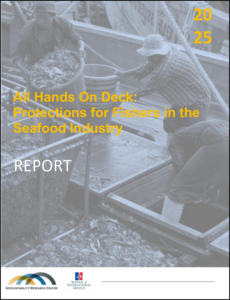 Each year, Judy Gearhart works with teams of graduate students to assess HRDD laws and corporate practice in the seafood industry. Their reports, based on documentary research and practitioner interviews, summarize current policy debates.The 2025 report (left) examines protection of fishers’ rights; the 2024 report reviewed transparency initiatives; the 2023 report highlighted recruitment issues and HRDD laws; and the 2022 report looked at HRDD laws, NGO demands, and corporate policies.
Each year, Judy Gearhart works with teams of graduate students to assess HRDD laws and corporate practice in the seafood industry. Their reports, based on documentary research and practitioner interviews, summarize current policy debates.The 2025 report (left) examines protection of fishers’ rights; the 2024 report reviewed transparency initiatives; the 2023 report highlighted recruitment issues and HRDD laws; and the 2022 report looked at HRDD laws, NGO demands, and corporate policies.
Featured resources
Defining Corporate Duties in Seafood Supply Chains to Prevent IUU Fishing and Labor Rights Abuses
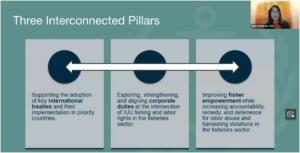
In a webinar hosted by Chavi Keeney Nana (Interfaith Center on Corporate Responsibility) in October 2025, Judy Gearhart and Sari Heidenreich (Greenpeace) spoke about corporate duties in seafood supply chains to prevent illegal, unreported, and unregulated (IUU) fishing and labor rights abuses.
Judy explained the Fisheries Governance Project’s work on three pillars: international treaties, corporate duties, and fisher empowerment.
The presentation highlighted the importance of engaging with fisher unions and organizations in human rights due diligence efforts – watch it here.
Interviews with Organizers: The Labor Link Podcast
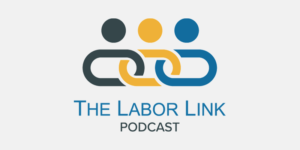
The Labor Link Podcast features the experience and analysis of worker organizers who are advocating for worker rights and corporate and government accountability in the apparel and seafood sectors.
Hosted by Judy Gearhart, the Labor Link Podcast is affiliated with the Labor Radio Network.
Series 2 (2024-5)
- Episode 1: John Hartough (International Transport Workers’ Federation) on the challenges of organizing migrant workers in the Thai fishing industry.
- Episode 2: Mario, Nguyen, and Lin (organizers with the Fishers’ Rights Network) on challenges and obstacles to their rights education and organizing work to improve wages and working conditions.
- Episode 3: TheHoya Dy (Center for the Alliance of Labor and Human Rights) on CENTRAL’s approach to working with migrant fishers working in Thailand, which connects direct services and training on safe migration with organizing and community-based network building.
- Episode 4: Hariyanto Suwarno (Indonesian Migrant Workers Union) and Charli Fritzner (Greenpeace USA) on how Indonesia’s oldest migrant workers union came to work on fishers rights and Greenpeace’s campaigns for seafood brands to phase out transshipment and implement real human rights due diligence.
- Episode 5: Arnon Hiborang (SAKTI-SULUT) talks about his life as a migrant fisher on the Taiwanese fleet, and the new union he has founded in North Sulawesi to provide support to young fishers.
- Episode 6: Eric Mawuko Atsiatorme talks about the traditional structure of the artisanal fishing sector, women’s unique role, and the changing seascape of fishing and fisheries policy in Ghana.
- Episode 7 (in English and Spanish): José Luis Carillo (CONMECOOP) discusses a cooperative-centerd approach to marine conservation and the importance of insitutional alliances in advocating for better rights and conditions for smallholder fishers in Mexico.
Series 1 (2022)
- Episode 1: Sawit Kaewaan (State Enterprises Workers’ Relations Federation) on mobilizing national trade unions to support migrant workers in Thailand.
- Episode 2: Tola Moeun (Centre for the Alliance of Labor and Human Rights) on social movements and transnational organizing for apparel workers’ rights in Cambodia.
- Episode 3: Kalpona Akter (Bangladesh Center for Workers’ Solidarity) on bringing bottom-up organizing to shape global campaigns for apparel workers in Bangladesh.
- Episode 4: Aung Kyaw (Migrant Worker Rights Network) on bringing his activist drive from Myanmar to organizing migrant workers in Thailand.
Series 1 was produced by Evan Matthew Papp of Empathy Media Lab and Series 2 is produced by Jules Taylor.
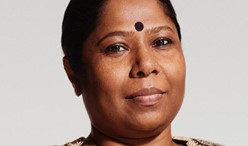
“I believe once you start work for worker rights, you cannot stop. You just can’t stop yourself. I need to protest. I need to have these workers’ backs.” Kalpona Akter
Counterparts, Allies and Collaborators
Action research collaborators include:
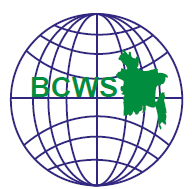
Bangladesh Center for Workers’ Solidarity, Bangladesh
The work is funded by The David & Lucille Packard Foundation, Multiplier, and 21st Century ILGWU Heritage Foundation.
Related Resources
2025
Corporate Accountability in Global Health Governance Needs a Rethink: Beyond Rankings and Voluntary Corporate Measures , statement of an Independent Expert Group, United Nations University and International Institute for Global Health (Phillip Baker, Sharon Friel, Judy Gearhart, K.M. Gopakumar, Chileshe G. Mange, Katharina Miller, Ashka Naik, Akinbode Oluwafemi, Margie Ong, Diana Silva, Els Torreele, Benjamin Wood, 2025)
Mexico Fisher Organizations Convening Report (Rosario Espinoza Martínez and Pablo Yáñez, 2025)
Ghana Fisher Learning Exchange Report (Eric Mawuko Atsiatorme, 2025)
All Hands On Deck: Protections for Fishers in the Seafood Industry report of a field practicum on behalf of the Fisheries Governance Project (Judy Gearhart and Connor Moynihan (eds.), Jeidy Barrios, Nicole Bernard, Jill Coleman, Parker Elizabeth, Judy Gearhart, Carlye Goldman, Natalie Leonard, Robert Menner, Jessica Mensah-Brown, Siobhan Powers, Aisha Tewfik, 2025)
Defining Corporate Duties in Seafood Supply Chains to Prevent IUU Fishing and Labor Rights Abuses (webinar with Judy Gearhart and Sari Heidenreich of Greenpeace, October 2025)
Communique from the participants of the Ghana Fisher Learning Exchange Forum (workshop participants, July 2025)
Upwelling: Fishers Organizing for their Rights and Sustainable Fisheries (Judy Gearhart and Connor Moynihan, 2025) – also in Bahasa, Chinese, Spanish, and Thai
Fisher Organizing in Thailand – A Country Case Study (Judy Gearhart, 2025)
Fisher Organizing in Ecuador – A Country Case Study (Connor Moynihan and Tito Navia, 2025)
Fisher Organizing in Ghana – A Country Case Study (Connor Moynihan, Judy Gearhart, Eric Mawuko Astiatorme, 2025)
Fisher Organizing in Indonesia – A Country Case Study (Judy Gearhart and Azizah Hapsari, 2025)
Fisher Organizing in Taiwan – A Country Case Study (Johanna Lee, 2025)
2024
Casting Light on the Deep: Can Greater Transparency Protect Fishers and Save Our Oceans? report of a field practicum on behalf of the Fisheries Governance Project (Judy Gearhart (ed.), Jacob Álvarez, Cynthia Cheetham, Erica Cherepko, Ava Clarcq, Ali Freishlag, Mia Hoskins, Lea Hunter, Gemma Muirhead, Valentina Soto Ruiz, Christopher Unruh, and Casey Willson, 2024)
2023
Building Worker Power in Global Supply Chains: Lessons from Apparel, Cocoa, and Seafood, webinar (Laine Romero-Alston, Senior Advisor for Strategic Partnerships and Stakeholder Engagement at the US Department of Labor’s International Labor Affairs Bureau (moderator); Judy Gearhart, Research Professor, Accountability Research Center, American University School of International Service (presentation); Shareen Hertel, Wiktor Osiatyński Chair of Human Rights & Professor of Political Science, University of Connecticut (commentator) and Lance Compa, Senior Lecturer Emeritus, Cornell University, School of International Labor Relations (commentator).
Building Worker Power in Global Supply Chains: Lessons from Apparel, Cocoa, and Seafood, Accountability Working Paper (Judy Gearhart, September 2023)
Ten years after Rana Plaza: Remembering, learning, moving forward, short video (BRAC Institute of Governance and Development, 2023)
Ten Years After Rana Plaza, research brief (Maheen Sultan, Iffat Jahan Antara, and Touhidul Islam, 2023). Bengali version.
A Deeper Dive: Remedy and Recruitment in the Seafood Industry, report of a field practicum on behalf of the Fisheries Governance Project (Judy Gearhart (ed.), Kelcey Allen Rodriguez, Sloane Hardin, Suhyeon Kim, Victoria Latham, Olivia Marr, Samuel McGovern, Carla Montilla, Connor Moynihan, Heather Mullen, Kiley Nivens, Matthew Ridgeway, 2023)
Accountability in the seafood industry: protecting fisheries and fishery workers, research presentation and discussion (Judy Gearhart, Victoria Latham, Connor Moynihan, Sloane Hardin, Ian Urbina, and Anne Zollner, May 2023)
Supporting migrant fishers’ rights, panel presentation (Kevin Cassidy, Anne Zollner, Tola Moeun, Jennifer Rosenbaum, and Judy Gearhart, March 2023)
Defending Democracy: A New Approach for Apparel Industry Supply Chains, Sourcing Journal article (Judy Gearhart, March 2023)
Why This Labor Expert Urges Brands to Stop ‘Shooting Yourself in the Foot’, Sourcing Journal article (Jasmine Chua Malik, March 2023)
Local Voices, Global Action: Transnational Organizing in Apparel Supply Chains, Accountability Working Paper (Judy Gearhart, March 2023)
Coping with modern slavery in the fisheries sector, Destructive Fisheries Indonesia (DFI) podcast (Judy Gearhart discussing fishery workers’ rights, January 2023)
2022
How can data used to trace seafood also fight human rights and labor abuses in this industry? Seafood Alliance for Legality and Traceability (SALT) podcast (Judy Gearhart and Rainer Braun, September 2022)
Human Rights and Environmental Due Diligence in the Seafood Industry, report of a field practicum on behalf of the Fisheries Governance Project (Judy Gearhart (ed.), Christopher Clayton, Jason Cowan, Michaela Dreeszen, Madeline Elminowski, Kyra Jones, Alex Mathews, Rishi Parikh, Luisa Pavarino Spezia, Leah Rullman, and Nina Song, 2022)
2021
(Dis)Incentivizing Democracy; the Role of Global Corporations in Cambodia opinion piece, Business & Human Rights Resource Center (Judy Gearhart, 2021)
How Can the World Bank Reduce Child Labor and Farmer Poverty with its Proposed Côte d’Ivoire Cocoa Project? blog, Bank Information Center (Sofia Dinn with Judy Gearhart, 2021)
The Corporate Accountability Paradox Accountability Keywords blog (Judy Gearhart, 2021)
Is the Thai government punishing anti-human trafficking advocates? news article, Thomson Reuters Foundation (Judy Gearhart, 2021)
The Corporate Accountability Paradox opinion piece, Business & Human Rights Resource Center (Judy Gearhart, 2021)
2020
Picturing Accountability: What We Learned from the Photography of the Rana Plaza Disaster ARC Working Paper (Ismail Ferdous and Naomi Hossain, 2020)
Rethinking MSIs: MSIs and the Search to Cure the Global Governance Gap MSIntegrity blog (Judy Gearhart 2020)
Health Worker Protests & Proposals ARC research page

